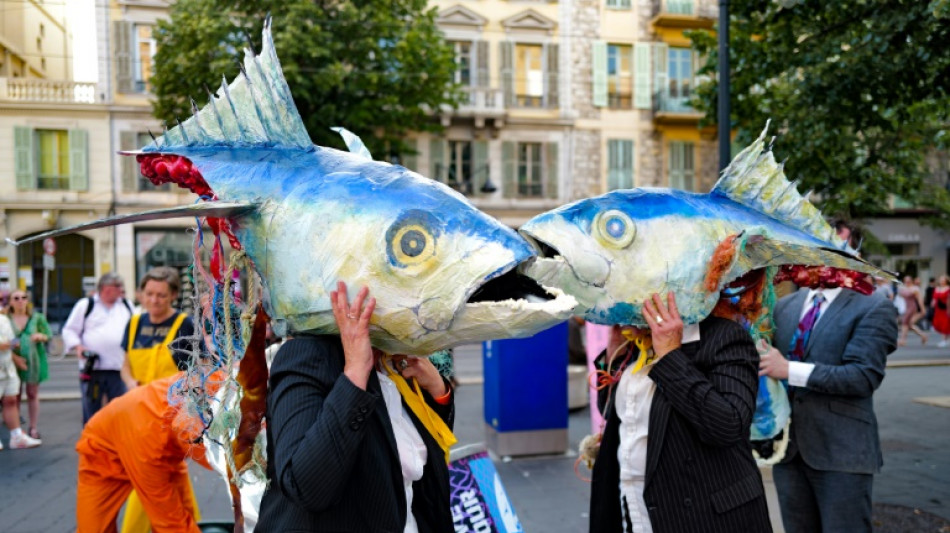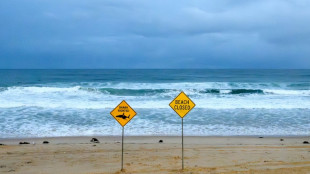
| RIO | 0.22% | 85.32 | $ | |
| CMSC | -0.66% | 23.325 | $ | |
| SCS | 0.12% | 16.14 | $ | |
| BTI | -1.95% | 57.105 | $ | |
| RBGPF | -1.87% | 82.5 | $ | |
| NGG | -0.63% | 80.38 | $ | |
| JRI | 0.01% | 13.702 | $ | |
| BCE | 1.09% | 24.405 | $ | |
| BCC | -2.01% | 83.825 | $ | |
| RYCEF | 0.87% | 17.2 | $ | |
| CMSD | 0.08% | 23.94 | $ | |
| VOD | 0.48% | 13.535 | $ | |
| RELX | -2.54% | 40.6 | $ | |
| AZN | -4.4% | 90.45 | $ | |
| GSK | -0.4% | 48.03 | $ | |
| BP | -0.06% | 35.36 | $ |
UN summit to end with boost for ocean conservation

A summit on the state of global oceans concludes Friday with nations having tested the waters on deep-sea mining and making strides towards protecting unpoliced reaches of the high seas.
But the UN Ocean Conference is set to fall short on major new financial pledges for poorer island nations, and many delegates are also disappointed that fossil fuels dropped off the agenda.
France welcomed more than 60 world leaders to the southern city of Nice along with thousands of scientists, business leaders and marine conservationists for the five-day event.
It was just the third time nations had come together for the oceans at the UN level, and it was the largest gathering of its kind so far.
Many nations, including Colombia, Greece and Samoa, took the opportunity to unveil plans to create vast new marine parks and protected areas.
Others announced restrictions on bottom trawling, a destructive fishing method captured in grisly detail in a David Attenborough documentary that went viral ahead of the summit.
But marine groups praised efforts to ratify a landmark pact to protect marine life in the 60 percent of oceans that lie outside national waters.
France had hoped at Nice to secure the 60 ratifications necessary to bring the high seas treaty into force.
By Thursday evening, 51 nations had ratified the agreement in what Rebecca Hubbard from the High Seas Alliance described as a "major milestone for ocean action".
"While we celebrate this incredible progress, we urge all remaining nations to ratify without delay," she added.
- Mining and money -
The conference sought to rally global action on marine protection as countries tussle over global rules for plastic pollution and seabed exploration.
More than 90 ministers issued a symbolic statement at Nice reaffirming their support for the strongest possible plastics treaty to be negotiated when the talks resume in August.
It also provided an opportunity to defend the role of science and rules-based oversight of common resources, most notably the unknown depths of the oceans.
Alarmed at US President Donald Trump's unilateral push to fast-track deep-sea mining, leaders called for strict global rules to govern the ocean floor to stop a damaging race for critical minerals.
The International Seabed Authority meets in July to negotiate these rules.
"There has been a hardening of tone following the decision of the USA," Francois Chartier of Greenpeace told AFP.
But at Nice, very few countries added their name to a global call for a moratorium on seabed mining. "It's a disappointment," said Chartier.
New financial commitments from rich governments were also missing, a key demand of small-island nations confronting sea-level rises, overfishing and marine pollution.
The summit will produce a joint political statement at its close on Friday that critics say is weak and without any reference to fossil fuels -- the key driver of ocean warming.
OceanCare, a marine conservation organisation, said the summit "must not produce another well-meaning declaration".
"The science is clear. The path is clear. What is missing is genuine political commitment and implementation."
T.Rivera--SFF

 London
London

 Manchester
Manchester
 Glasgow
Glasgow
 Dublin
Dublin
 Belfast
Belfast
 Washington
Washington
 Denver
Denver
 Atlanta
Atlanta
 Dallas
Dallas
 Houston Texas
Houston Texas
 New Orleans
New Orleans
 El Paso
El Paso
 Phoenix
Phoenix
 Los Angeles
Los Angeles

